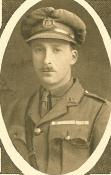
War Memorial
| Lieutenant Augustus Stephen AGELASTO MC | |
|
B Company, 1st Battalion Dorsetshire Regiment attached to the 6th (Service) Battalion Date of birth: 17th January 1888 Date of death: 8th November 1916 Killed in action aged 28 Buried at Guards Cemetery, Lesboeufs Plot X Row X Grave 9 |

|
| Augustus Stephen Agelasto was born at 71 Gloucester Terrace, Paddington in London on the 17th of January 1888 the second son of Stephen Augustus Agelasto, a stock broker, and Caterina Ambrosios (nee Ralli) Agelasto later of 185, Gloucester Terrace, Hyde Park in London. He was educated at Hazelwood School until April 1901 where he was a member of the 2nd Football XI in 1898 and 1899. He was a member of the Football XI in 1900 when the school magazine wrote the following on his season: - "Left wing. His great pace occasionally renders him dangerous, but his efforts are spasmodic and his centres lack accuracy. Rarely does he anticipate a pass, while his general attitude towards his opponents is far too gentile and polite." On leaving the school the magazine wrote of him: - "He has been one of the best 1/4 mile runners, and a capital footballer and musician." He went on to Harrow School where he was in Mr B. Smith's House from April 1901 to December 1903. In 1909 he went to work for a Swiss bank until 1910 when he went to work for his father as a clerk in his firm of stockbrokers Agelasto & Co of 20 Great Winchester Street, London leaving in October 1912 when he joined the Greek Army. He saw action in the Balkan Wars where he distinguished himself. He left the army in September 1913 and returned to work for his father, whose company had moved to 10 Throgmorton Street. In February 1914 he made a verbal agreement with the Woodstock Motor Co of Woodstock Street London to work as a salesman on a 25% commission but, as he made no sales, he left them a month later. Instead he was declared bankrupt on the 20th of April and in his application he stated that since leaving the Swiss bank he had been working for he was living on an allowance of £120 a year from his father but, that at the time of his application, he had no employment. On the outbreak of war he joined the army, attending the Royal Military College Sandhurst from where he was commissioned as a 2nd Lieutenant in the Dorsetshire Regiment on the 17th of February 1915. He left for the front in March 1915 where he was attached to the 1st Battalion of his regiment at Ypres. The battalion saw considerable action during this period and the regimental history records that: - “Several daring patrols were carried out and in this connection 2nd Lieutenant Agelasto did excellent work”. While serving with the 1st Battalion in 1915 one of his men, Private Ernest Shepard of B Company, mentions him in his diary in an entry dated the 29th of May 1915:- “One funny thing I have just remembered. One of our officers Lt Agelasto was stripped in his dugout when the Huns gassed. He had been out all night and fell in a Johnston hole, getting wet through. When we ran up he just put his gun, boots, coat and waterproof coat on, and he looked a real sketch, we had to laugh even at that critical time and later we fixed him up with a pair of trousers” On the 26th of May 1915, during a period when the battalion were holding trenches at Hill 60, he was wounded by a bullet which struck him in the face . After a period of recuperation he returned to the front, where from November 1915 he served for a while as an interpreter on the Headquarters Staff in Salonica. He was mentioned in despatches in the London Gazette of the 1st of January 1916 and was awarded the Military Cross in the New Year’s Honours List of January 1916 which appeared in the London Gazette of the 14th of January 1916. Private Shepard mentions him again in his diary in an entry on the 16th of January 1916:- “Also to my great delight my Company Commander Captain Agelasto has been awarded the Military Cross, the same Lieutenant Agelasto who used to command the company back in May 1915. He is now gone to Serbia. I have mentioned him before; he rushed up the hill naked in 1915.” On the 19th of February 1916 he was admitted to 32nd Field Ambulance and on the 26th of February was admitted to No. 4 Canadian General Hospital suffering from muscular cramps brought on by the bullet wound he had suffered in the face the previous year. He was evacuated to Malta on the 6th of March 1916, landing there on the 10th of March and was admitted to Blue Sisters Hospital on the island later the same day. He was evacuated to England on board the hospital ship "Rewa" on the 2nd of April 1916, landing at Devonport on the 10th of April. On the day of his arrival a Medical Board considered his case at Devonport and concluded that he was fit to travel, that he was improving, but that he should be classified as unfit for general service for a period of three months. On the 16th of June 1916 a Medical Board was convened at Caxton Hall which concluded:- "Recovered from symptoms of neurasthenia now fit for light duty. Unfit for one month." He was posted to Upton Camp at Weymouth where he joined the 3rd Battalion of his regiment. On the 13th of July 1916 a further Medical Board sat at Northe Hospital in Weymouth which reported:- "Has neurasthenia as a result of GSW to face. Improved but still nervous--twitchings of the face, intolerant of sudden noises--two months unfit. Somewhat deaf. Was hit by rifle bullet right side of face." On the 16th of August he returned to Northe Hospital once more for another Medical Board:- "Returned from Salonica suffering from nervous breakdown for the second time. Right hearing probably permanently affected. Grant one month as unfit." On the 16th of September 1916 he reported to Northe Hospital for a final Medical Board which concluded:- "Wounded by GSW to face. Said hearing has improved in right ear and general condition has improved. Marked fit for general service." He returned to the front in October 1916 where he was attached to the 6th Battalion of his regiment and was promoted to Lieutenant on the 20th of October. On the 6th of November 1916 the battalion relieved the 7th Battalion Yorkshire Regiment in trenches between Lesboeufs and Gueudecourt on the Somme, coming out again on the 11th of November when they returned to Citadel Camp. Conditions in the line were appalling, with no communication trenches the men had to cross a morass of mud to reach the front line. On the 8th of November Lieutenant Agelasto led a party carrying hand grenades to C Company who were preparing an attack to relieve a French attack further to the south. On his return he was killed by a shell while near battalion headquarters. His parents received the following telegram dated the 13th of November 1916:- "Deeply regret to inform you 2/Lt A. Agelasto MC Dorset Regiment was killed in action Nov 8th. The Army Council express their regret." He is commemorated on the war memorial at the Royal Military College Sandhurst and on the memorial at Harrow School. |
|
| Went on to Harrow School |
Back